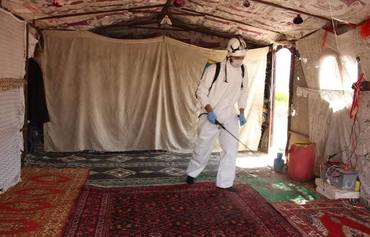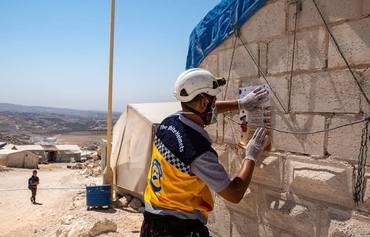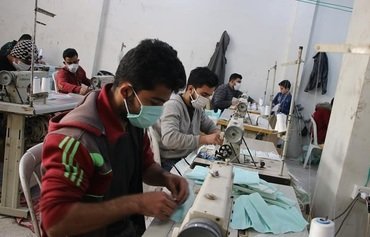Activists and relief workers in the Idlib region have warned of an imminent health disaster in light of continued strikes on the region by Syrian and Russian forces.
Novel coronavirus (COVID-19) infections in the last opposition-held territory in Syria have been increasing rapidly.
The area is home to nearly 4 million people, most of them displaced and living in camps or unfinished buildings.
Khaled al-Khatib, a member of the Syrian Civil Defence (White Helmets), told Diyaruna Russian airstrikes on the one hand and shelling by the Syrian regime on the other, have driven displaced families who had recently returned to their homes back to the displacement camps.
![Syrian Civil Defence (White Helmets) members help a family move from their town, to escape renewed shelling by Syrian regime forces and their allies. [Photo courtesy of Syrian Civil Defence]](/cnmi_di/images/2020/11/25/27158-Syria-White-Helmets-600_384.jpg)
Syrian Civil Defence (White Helmets) members help a family move from their town, to escape renewed shelling by Syrian regime forces and their allies. [Photo courtesy of Syrian Civil Defence]
Despite an Idlib truce announced in March by Russia, Russian warplanes carried out eight successive airstrikes on the town of al-Hamama near Jisr al-Shughour in western rural Idlib October 15th, killing two civilians and wounding more than 10 others.
And on November 4th, four children were among seven civilians killed in Syrian regime bombardments in the province.
"Displacement and mingling at already overcrowded camps have led to a surge in the number of COVID-19 infections over the past several weeks," al-Khatib said.
Although an accurate number of infections and ensuing deaths is hard to deduce, he said, an estimated 10,000 people have been diagnosed with the virus, some 100 of whom have died.
The region faces a severe shortage of COVID-19 test kits. Meanwhile, many who experience coronavirus symptoms do not visit a medical facility to be examined or tested, he added.
"In the north-west [of Syria], confirmed cases have increased six-fold over the last month, with cases also rising in displacement camps and settlements," Mark Lowcock, UN Under-Secretary-General for Humanitarian Affairs said in late October.
'Social distancing not feasible'
Al-Khatib said the White Helmets, in collaboration with other relief and government organisations, have set up several medical facilities to quarantine and treat people infected with the virus.
However, he said, the threat of a health disaster in the Idlib region during the winter still looms.
"Medical and relief organisations are doing everything they can to promote social distancing practices, but overcrowded camps make that very difficult, especially in the winter," Idlib civil activist Musab Assaf told Diyaruna.
Most of the roads that lead to refugee camps, as well as the camps themselves, are flooded, which disrupts and delays the distribution of aid, he said, adding that inadequate medical funding has exacerbated the problem.
The number of people killed and wounded in Syrian regime shelling is also on the rise in the city of Idlib, and the towns of Ariha, Shannan, Ehsim, Sarjah, Kansafra, Marayan, Balyoun and al-Bara in southern rural Idlib, and many areas in northern Idlib, such as the town of Kafraya.
Residents of these towns, Assaf said, are being forced to leave and aid organisations are helping transport them to relatively safer areas in villages and camps near the border with Turkey.
Former Maaret al-Numan resident Hani al-Numan, who recently relocated his family to a town near the Turkish border, said that hundreds of families are sharing homes because there are not enough houses to accommodate internally displaced persons (IDPs) and the camps are at full capacity.
"The situation is worsening in light of airstrikes targeting several populated towns, making living conditions for most residents of the Idlib region even worse," he told Diyaruna.
Due to the high prices of fuel and firewood, most families cannot have heated homes in the cold weather, "so the primary concern of most families is finding any kind of flammable material to heat their homes", he said.

![Displacement camps are flooded in the Syrian province of Idlib, the last opposition-held stronghold in north-west Syria. [Photo courtesy of Syrian Civil Defence]](/cnmi_di/images/2020/11/25/27157-Syria-Idlib-camps-600_384.jpg)






